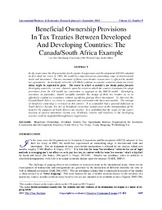Beneficial ownership provisions in tax treaties between developed and developing countries: the Canada/South Africa example
Abstract
In the years since the Organisation for Economic Cooperation and Development (OECD) adopted
its first draft tax treaty in 1963, the world has experienced an astonishing surge in international
trade and investment. The tax treatment of these cross-border transactions is affected by double
tax agreements. As tax treaty networks will likely continue to expand, concerns about tax treaty
abuse might be expected to grow. The extent to which a country’s tax treaty policy favours
developing countries - or not - depends upon the extent to which the country is prepared to adopt
provisions from the UN model tax convention as opposed to the OECD model. Developing
countries, in particular, should carefully consider the design of their tax treaties so as to
effectively combat tax avoidance without sacrificing foreign direct investment. To this end, the
Canada/South Africa tax treaty is compared and contrasted with these two models. The concept
of beneficial ownership is reviewed in this context. It is contended that a general definition in
South Africa's Income Tax Act of 'beneficial ownership' would assist in the interpretation of the
term for the purposes of South Africa's tax treaties. It is submitted that the scope for the source
taxation of passive investment income (viz. dividends, interest and royalties) in the developing
country could be magnified through treaty negotiations.

